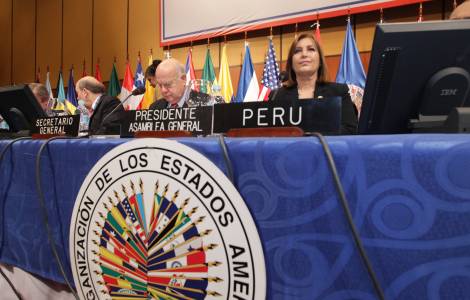
San José (Agenzia Fides) - The Inter-American Court of Human Rights (CIDH), the judicial body of the Organization of American States (OEA), is putting pressure on the 23 member countries so they recognize same-sex unions. On 9 January, in response to a request from Costa Rica (member country) in May 2017, the Court said the countries it oversees should treat same-sex couples “without discrimination,” ensuring that they receive the same family and financial rights as heterosexual couples.
In this regard, lawyer Juan Puertas, president of the "Asociación Antonin Scalia" of Peru, tells Fides that as a consequence of the Court’s decision, marriage will cease to be an institution. According to the lawyer, "if love is what matters, we are renouncing the right, because law is a prescriptive science of what it must be, which generates objective protection based on reality and not based on feelings, which come and go".
It should be noted that 79 per cent of Peruvians reject marriage between two persons of the same sex, while family formed by the union of a man with a woman is the most appreciated aspect for the vast majority of the population of Peru (89%). Despite being a sovereign country, with a clear Constitution on marriage between a man and a woman, which expresses the religious and traditional sentiment of the great majority of Peruvians, CIDH has urged all member countries of Latin America to recognize homosexual marriage and to extend the same rights granted to heterosexuals to these couples.
Responding to the question whether it is valid for CIDH to impose an agenda on member countries, lawyer Juan Puertas tells Fides that the Court is surpassing its powers and that it also ignores the Constitutions of individual States: "The Constitution cannot undergo a decision by CIDH, which is also only a consultation in response to a specific country", explains the lawyer. "CIDH must analyze the Constitution before issuing a verdict. There must be a natural coexistence between what CIDH establishes and what national constitutions establish. Otherwise we would be in an international oligarchy that imposes on us what we must do and not do", concludes Puertas.
Currently the member countries of the Inter-American Court of Human Rights are: Argentina, Barbados, Bolivia, Brazil, Colombia, Costa Rica, Chile, Dominica, Ecuador, El Salvador, Grenada, Guatemala, Haiti, Honduras, Jamaica, Mexico, Nicaragua, Panama, Paraguay, Peru, the Dominican Republic and Suriname. Trinidad and Tobago abandoned the American Convention on Human Rights in 1998 and Venezuela in 2012. (DB/LG) (Agenzia Fides, 24/01/2018)